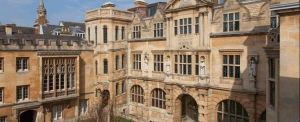The bard is an underappreciated class in Dungeons & Dragons. Often seen a little more than Shakespeare in leather armor, many players assume that the bard’s musical skills aren’t worth the time or effort.
The bard has a lot of upside, though—the class can wield both finesse weapons and light armor, its spells pack a wide variety of support skills, and the bard is often the public face of the party in social situations. Strength and endurance might not be the bard’s specialty, but everyone in the party can’t be a berserker or knight. In short, a well-played bard is like a rock star that secretly moonlights as a magical ninja.
Luckily for us, bards do not exist solely in the grids and rulebooks of roleplaying games. Examples abound of women and men who could wield both sword and pen, but one of the greatest non-D&D bards to walk our earth was the British explorer, polymath, and soldier of fortune Sir Walter Ralegh.
Ralegh is the bard made flesh, and he managed to dip his fingers into every subject he could find—poetry, navigation, diplomacy, shipbuilding, history, warfare, and medicine, to name a few. We here at Nerds On Earth are embarking on an adventure of our own: an exploration of a real-life bard, a man who lived more in his life than a dozen lesser men.
Ralegh is rarely mentioned or remembered these days, but we’re going to bring this amazing but often forgotten bard out of the shadows and into the bright light of history. (Note: while “Raleigh” is the more common spelling among modern English speakers, our subject preferred “Ralegh” and often signed his papers using this spelling—in deference to him, we will use his spelling.)
The Life of Sir Walter Ralegh, the Story of England’s True Life Bard
Ralegh doth time bestride,
He sits ‘twixt wind and tide,
Yet uphill he cannot ride
For all his bloody pride.
Thus ran the words to a popular English street ballad in the later years of Elizabeth I’s reign (1558-1603). Sir Walter Ralegh, labeled “the best hated man in the world” by the scholar Martin Hume, spent his days sailing the rough seas of fortune, buoyed to the heights by the whims of his Queen and pulled down by the jealous ambitions of lesser men.
Ralegh’s astounding intellectual output and impact on the world around him were often restrained by his own idiosyncrasies and the political and religious feelings boiling through the royal court throughout the late sixteenth and early seventeenth centuries.
Born sometime in the early 1550s in the far southwest of England, Ralegh grew up in a proud and abundant family (Ralegh’s half-brother was the distinguished explorer Sir Humphrey Gilbert, and he was distantly related to Sir Francis Drake and Kat Ashley, the Queen’s childhood governess). But as the youngest son, Ralegh could entertain no fantasies of an easy inheritance.
Raised Protestant in an intensely anti-Catholic family, young Walter’s calm before the storm ended by the time he turned seventeen around 1569. Fighting for the Huguenots, a persecuted and despised group of Protestants in Catholic France, the teenage Ralegh fought as a mercenary in a religious civil war that ominously foreshadowed the approaching fate of his own country.
The carnage had a serious effect on the young soldier, who later wrote, “There are no such things as Wars of Religion, only Civil Wars, and by Civil War no nation is ever bettered.” This might be the point at which Ralegh’s intense nationalism began to form, a trait that shatters all arguments later made against him of treason.

After returning from the French religious wars, Ralegh had leveled up and his thoughts turned from combat to education. (Mark +2 to hit on your character sheets, plus +1 INT and +2 CHA as well.) His father–a moderately well-to-do country squire (father of the bard) in the tiny village of East Budleigh in Devonshire–could only afford one year of schooling for young Walter at Oriel College at Oxford.
But the young buck seems to have made the most of his year at university, where he excelled in philosophy and oratory (the seventeenth century antiquarian Anthony Wood called him “the ornament of the juniors”, granting the bard advantage on all his bluff, diplomacy, and performance rolls) before leaving Oriel without a degree.
At this point Ralegh disappears from the record for a few years, and concrete historical and textual information is scarce on most of his twenties. This formative stage of Walter Ralegh’s life did not last long, but he came flying out of childhood eager for a chance at wealth, fame, and adventure. His day was still dawning, and fortune and glory—things that would lead him to the throne of a Virgin Queen—only slowly approaching…
Come back to Nerds On Earth for Part 2 soon!

